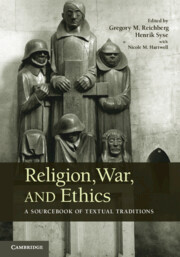Book contents
- Frontmatter
- Contents
- Notes on Contributors
- Preface
- Introduction
- 1 Judaism
- 2 Catholic Christianity
- 3 Eastern Orthodox Christianity
- 4 Protestant Christianity
- 5 Sunni Islam
- 6 Shi‘ite Islam
- 7 Hinduism
- 8 The Buddhist Traditions of South and Southeast Asia
- 9 Chinese and Korean Religious Traditions
- 10 The Religious Traditions of Japan
- 11 Sikh Tradition
- Index
5 - Sunni Islam
Published online by Cambridge University Press: 05 June 2014
- Frontmatter
- Contents
- Notes on Contributors
- Preface
- Introduction
- 1 Judaism
- 2 Catholic Christianity
- 3 Eastern Orthodox Christianity
- 4 Protestant Christianity
- 5 Sunni Islam
- 6 Shi‘ite Islam
- 7 Hinduism
- 8 The Buddhist Traditions of South and Southeast Asia
- 9 Chinese and Korean Religious Traditions
- 10 The Religious Traditions of Japan
- 11 Sikh Tradition
- Index
Summary
The readings that follow provide examples of Sunni Muslim discourse on matters of armed force. In this connection, a few introductory comments about the term “Sunni” are in order.
To begin: the qualifier “Sunni” distinguishes some Muslims from others, in this case the various Shi‘i groups. The position of the latter is outlined elsewhere in this volume; with respect to armed force, the most important differences have to do with leadership, and thus with authority to order Muslim forces to fight. For Shi‘i Muslims, such authority is often restricted to the designated Imam of the Age or, in his absence, his appointed representative. For Sunni Muslims, authority belongs to those who are selected though a process of consultation and to whom the Muslim community pledges loyalty. For many centuries, and thus for many of the scholars whose opinions are presented in the first part of this collection, this meant that authority for war rested with the Caliph (khalifa, one who “follows” in the way of the Prophet) or with his representative (usually the sultan, indicating possession of the requisite “power” to conduct war). In the modern period, when such historic political institutions no longer exist or are in question, authority for war constitutes a particularly contentious issue; the selections from contemporary Sunni discourse reflect this.
In addition to the question of authority, several other aspects of the qualifier “Sunni” are worth noting. The term is part of a longer phrase that may be translated as “the people who follow the example of the Prophet and who value the consensus of the Muslim community” (ahl al-sunna wa-l-jamā‘a). “Sunni” is thus shorthand, pointing to the value placed on reports (a ḥadīth) of the words and deeds of the Prophet Muhammad, as well as to the ways the majority of Muslims think about the implications of his prophetic example for Muslim practice. The judgments presented in this volume point to this, with scholars and others presenting arguments about the justification and conduct of war that appeal to these sources (along with the Qur’ān).
- Type
- Chapter
- Information
- Religion, War, and EthicsA Sourcebook of Textual Traditions, pp. 300 - 388Publisher: Cambridge University PressPrint publication year: 2014

